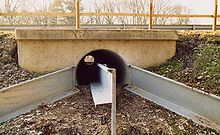
Amphibian and reptile tunnels, also known as herp tunnels, are a type of wildlife crossing that is positioned beneath a roadway. The tunnels allow amphibians and reptiles to cross roads without the risk of being crushed by a vehicle. They have been used by toads, frogs and salamanders. The tunnels are used to get to their Big Night, a mass courtship ritual which is known as a salamander congress.
In areas that do not have tunnels, municipalities enlist volunteers to hand-carry reptiles across roadways. Some governments in the United States and Europe build herp tunnels which are large enough to accommodate reptiles like turtles. Snakes also use tunnels to cross roads.
History

In the United States, the first amphibian tunnels were the Henry Street salamander tunnels. The tunnels were built in 1987 and they are in Amherst, Massachusetts. After the success of the Henry Street tunnels, the state of California built salamander tunnels under roads. In Davis, California a tunnel was built under a busy road to help toads cross the road. The United States Geological Survey has published a document stating that amphibian and reptile tunnels are best practices. They have created a guide which advocates for the use of more tunnels.
In other areas of the United States volunteers help amphibians cross roads by hand. In New Hampshire people still hand-move salamanders. The Harris Center for Conservation Education organizes a salamander Crossing Brigade made up of volunteers each year. In New Jersey volunteers assist salamanders and other amphibians crossing roads. New York state has a similar volunteer salamander assist project. The tunnels are used by the salamanders to get to vernal pools so that they can court mates on their Big Night. The courtship of the salamanders is known as a salamander congress.
Other countries have been creating amphibian tunnels to reduce amphibian mortality. In Sweden, officials created under road passages with double-sided guiding fences. In Germany, amphibian tunnels have been created to help frogs safely cross roads. In Europe, these tunnels are sometimes referred to as "herp tunnels" the name for the study of amphibians and reptiles: herpetology. The European herp tunnels followed the same design as the Henry Street tunnels: fences and tunnels beneath roads.
In Canada the city of Guelph, Ontario, has built tunnels to help reptiles cross roads. The tunnels are used by amphibians but they are large enough for snapping turtles. In addition other slow moving reptiles like garter snakes, brown snakes use the tunnels. In Britain tunnels were built under a roadway to help adder snakes cross the road. The tunnels have a grate on top so that sunlight can enter the tunnel for the cold-blooded reptiles.
In 2022 a senior housing developer in Davis was ordered to build tunnels for toads. The city Planning Commission required an 18 in (460 mm) wooden boardwalk above the waterline inside of two 8 ft (2.4 m) wide underground culverts.
See also
References
- Hofherr, Justine (25 March 2015). "There Are Teeny Tiny Underpasses for Salamanders in Massachusetts". www.boston.com. Boston globe Media Partners, LLC. Archived from the original on 21 May 2024. Retrieved 21 May 2024.
- Defenders (64 ed.). Washington, DC: Defenders of Wildlife. 1989. p. 20. Retrieved 21 May 2024.
- Western Ecological Research Center (WERC). "Research Spotlight: New Study Identifies Effective Under-Road Passage Designs for California Tiger Salamanders U.S. Geological Survey". www.usgs.gov. U.S. Geological Survey U.S. Department of the Interior. Archived from the original on 21 May 2024. Retrieved 21 May 2024.
- Bartell, John (22 July 2016). "Davis has a tunnel for toads?". ABC 10. Retrieved 23 May 2024.
- "Animal Crossing: New Research Guides Efforts to Protect California's Amphibians and Reptiles from Road Danger U.S. Geological Survey". U.S. Geological Survey U.S. Department of the Interior. Retrieved 23 May 2024.
- "Salamander Crossing Brigades". Harris Center Making Tracks in the Monadnock Region Since 1970. Harris Center for Conservation Education. 18 November 2017. Archived from the original on 8 March 2024. Retrieved 21 May 2024.
- Wheeler, David (18 March 2021). "Wild New Jersey Revisited: Salamander Crossing – It Could Be Tonight!". Conserve Wildlife Foundation of New Jersey. Archived from the original on 21 May 2024. Retrieved 21 May 2024.
- "Amphibian Migrations And Road Crossings - NYSDEC". dec.ny.gov. New York State. Archived from the original on 21 May 2024. Retrieved 21 May 2024.
- "The Biggest Night(s) of Spring". Mass Audubon. Retrieved 12 June 2024.
- Helldin, Jan Olof; Petrovan, Silviu O. (26 August 2019). "Effectiveness of small road tunnels and fences in reducing amphibian roadkill and barrier effects at retrofitted roads in Sweden". PeerJ. 7: e7518. doi:10.7717/peerj.7518. ISSN 2167-8359. PMC 6714967. PMID 31523500.
- "Germany builds $285,200 frog tunnel". NBC News. Reuters. 5 January 2004. Archived from the original on 24 July 2021. Retrieved 21 May 2024.
- Goldfarb, Ben (12 September 2023). Crossings: How Road Ecology Is Shaping the Future of Our Planet. New York, New Yok: W. W. Norton & Company. ISBN 978-1-324-00590-2. Retrieved 22 May 2024.
- Bellantoni, Santana (25 August 2023). "Critter crossing makes Maltby Road safer for turtles and others". Guelph Today. Retrieved 23 May 2024.
- McGowan, Cat (10 May 2024). "Tunnel of love? Cautious adders get a helping hand in Berkshire". BBC.
- Baker, Christopher (26 August 2022). "Davis land developer must build tunnel for toads to build senior housing - CBS Sacramento". CBS News. Retrieved 12 June 2024.
External links
 Media related to Amphibian and reptile tunnel at Wikimedia Commons
Media related to Amphibian and reptile tunnel at Wikimedia Commons